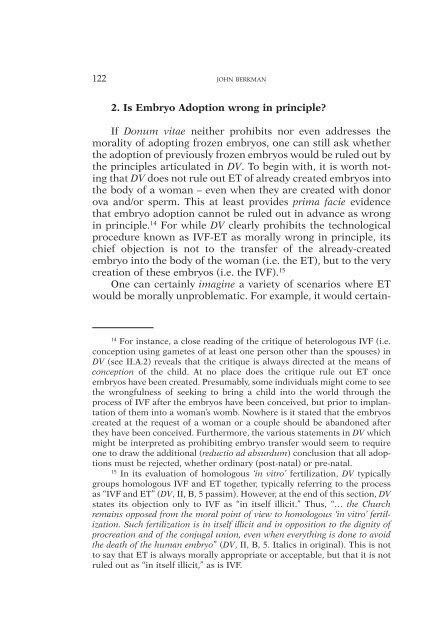Avant-propos - Studia Moralia
Avant-propos - Studia Moralia
Avant-propos - Studia Moralia
Create successful ePaper yourself
Turn your PDF publications into a flip-book with our unique Google optimized e-Paper software.
122 JOHN BERKMAN<br />
2. Is Embryo Adoption wrong in principle?<br />
If Donum vitae neither prohibits nor even addresses the<br />
morality of adopting frozen embryos, one can still ask whether<br />
the adoption of previously frozen embryos would be ruled out by<br />
the principles articulated in DV. To begin with, it is worth noting<br />
that DV does not rule out ET of already created embryos into<br />
the body of a woman – even when they are created with donor<br />
ova and/or sperm. This at least provides prima facie evidence<br />
that embryo adoption cannot be ruled out in advance as wrong<br />
in principle. 14 For while DV clearly prohibits the technological<br />
procedure known as IVF-ET as morally wrong in principle, its<br />
chief objection is not to the transfer of the already-created<br />
embryo into the body of the woman (i.e. the ET), but to the very<br />
creation of these embryos (i.e. the IVF). 15<br />
One can certainly imagine a variety of scenarios where ET<br />
would be morally unproblematic. For example, it would certain-<br />
14 For instance, a close reading of the critique of heterologous IVF (i.e.<br />
conception using gametes of at least one person other than the spouses) in<br />
DV (see II.A.2) reveals that the critique is always directed at the means of<br />
conception of the child. At no place does the critique rule out ET once<br />
embryos have been created. Presumably, some individuals might come to see<br />
the wrongfulness of seeking to bring a child into the world through the<br />
process of IVF after the embryos have been conceived, but prior to implantation<br />
of them into a woman’s womb. Nowhere is it stated that the embryos<br />
created at the request of a woman or a couple should be abandoned after<br />
they have been conceived. Furthermore, the various statements in DV which<br />
might be interpreted as prohibiting embryo transfer would seem to require<br />
one to draw the additional (reductio ad absurdum) conclusion that all adoptions<br />
must be rejected, whether ordinary (post-natal) or pre-natal.<br />
15 In its evaluation of homologous ‘in vitro’ fertilization, DV typically<br />
groups homologous IVF and ET together, typically referring to the process<br />
as “IVF and ET” (DV, II, B, 5 passim). However, at the end of this section, DV<br />
states its objection only to IVF as “in itself illicit.” Thus, “… the Church<br />
remains opposed from the moral point of view to homologous ‘in vitro’ fertilization.<br />
Such fertilization is in itself illicit and in opposition to the dignity of<br />
procreation and of the conjugal union, even when everything is done to avoid<br />
the death of the human embryo” (DV, II, B, 5. Italics in original). This is not<br />
to say that ET is always morally appropriate or acceptable, but that it is not<br />
ruled out as “in itself illicit,” as is IVF.

















